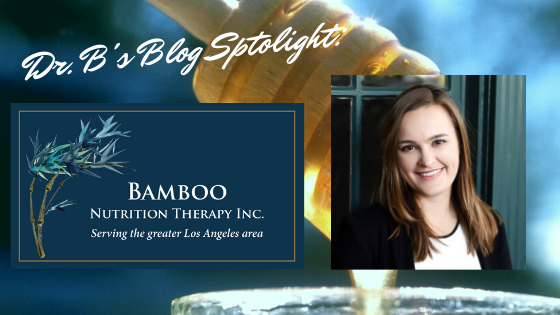Dr. B’s Professional Spotlight: Laura Gajda, RDN from Bamboo Nutrition Therapy, a HAES-affirming dietary group practice
“This job can be so rewarding, as I can witness someone that is so entrenched within their eating disorder blossom into the person that they want to be. As a dietitian, my main motto is that you have to ‘nourish to flourish.’”
-Laura Gajda, Lead Registered Dietitian and Outreach Coordinator
Health at Every Size (HAES) is a treatment approach commonly accepted within the community of eating disorder professionals used to address weight bias and stigma by normalizing diversity in body shape and size, promoting intuitive eating, and addressing psychological, cultural, and social factors that influence physical and mental health (Bacon, Stern,Van Loan, & Keim; Robinson, 2005). Weight bias and stigma have posed many issues for individuals seeking medical and mental health treatment (Phelan, S., Burgess, D., Yeazel, M., Hellerstedt, W., Griffin, J., & Vn Ryn, 2015).
In this professional blog spotlight, Dr. Ballardo interviewed Laura Gajda, a Registered Dietitian and Nutritionist, from the group practice, Bamboo Nutrition Therapy. Dr. Ballardo selected Bamboo Nutrition to be featured in this spotlight as a specialized community referral for individuals struggling with eating disorders, people who struggle with body/weight acceptance, and/or individuals who seek a healthier relationship with food. Bamboo Nutrition Therapy is a team of Health at Every Size (HAES)-affirming dietitians.
Laura Gajda is a Registered Dietitian and Nutritionist with a background in eating disorders and mental health diagnoses. She has worked at Bamboo Nutrition Therapy for over 2 years as a Registered Dietitian, Lead Dietitian and Outreach Coordinator. Laura was the Adolescent Dietitian at Rosewood Centers for Eating Disorders and specializes in educating and working with families of adolescents with eating disorders. In addition, she also specializes in working with adults that have eating disorders and building sustainability in their own recovery. Laura graduated from Eastern Michigan University with a Bachelor of Science in Dietetics where she also completed her internship. Looking forward to providing individualized care to each and every Client, Laura aims to work with clients to help individuals build their own sense of autonomy around food and decrease the power that food can have over their life.
Dr. Ballardo: Can you please tell us a bit about your group practice? Who works with you and what are the specialties that you and your colleagues provide?
Laura: We have a great group of Registered Dietitians that work at Bamboo Nutrition Therapy. There are 11 of us that work in the practice including knowledgeable dietitians and some wonderful administration to help clients. One of the unique things about our practice is that all of our dietitians specialize in Eating Disorders but have a variety of backgrounds such as; long term care, pediatrics or hospital settings. This allows for us to take on any client’s needs from a Health at Every Size (HAES) perspective.
Dr. B: Can you discuss what the potential benefits are to working with a dietitian?
Laura: Within our practice, we are able to work individually with clients to answer their nutritional questions. Everyone has a unique experience with food and it is not always positive. This practice allows for there to be a place to work on one’s relationship to food and manifesting a healthy relationship to food.
Dr. B: Does the practice accept insurance?
Laura: Yes, we are a practice that primarily works with insurances. To some capacity whether in-network or out-of-network, we work with many different insurances including some branches of Medi-Cal. Please call our office administration to see if your benefits are covered. If you are not covered our office administration works closely with clients to try to work out a payment plan that is reasonable for each individual.
Dr. B: How can a parent or loved one help support their child or spouse who is struggling with an eating disorder?
Laura: Well, this is a bit of a difficult question to answer in one simple answer as it is varying for different family situations. However, one of my biggest pieces of advice is that communication is key. An adolescent that has just been diagnosed with an eating disorder is a scary thing for a parent. It is okay to feel like you, the parent, do not have to have all the answers even though you would love to have them all sometimes it is okay to ask the adolescent their thoughts. The most important part is to talk to your adolescent to learn their triggers and understand what could be supportive when they feel activated.
Dr. B: Do you include families in your dietary counseling with clients? If so, can you tell the reader what that may look like?
Laura: Yes, we include families in dietary counseling if it is appropriate. Family sessions operate differently depending on the family’s knowledge of eating disorders and support that is necessary for the adolescent to recover. Sometimes, it can look like the parents come in for the full session or the parents come in for the first or last 15 minutes of session to talk about progress or areas that need more monitoring.
Dr. B: Can you talk about how you help teens increase intuitive eating?
Laura: In my opinion, it is easier (sometimes) for teens to know what they want and how much they want in terms of food. When we think about it, they are able to draw on more recent experiences of not allowing diet culture to take them over just because they are younger and not as much prolonged exposure to diet culture has occurred. I usually explain to them that as a baby they cried when they were hungry, and they stopped when they were full. It helps paint the picture for them that they can and did understand their own hunger and fullness cues at one point and it can empower them to eat more based off of their own cues.
Dr. B: What is your favorite thing about being a dietitian?
Laura: I enjoy seeing a client’s personality starting to come out and their eating disorder voices dissipating. This job can be so rewarding, as I can witness someone that is so entrenched within their eating disorder, blossom into the person that they want to be. As a dietitian, my main motto is that you have to “nourish to flourish.” This becomes apparent when I start to see my clients engaging more in life and doing things that inspire them as opposed to feelings they have of obligation.
Dr. B: If you weren’t a dietitian, what do you think you’d want to do for a living?
Laura: Oh, Interesting question. I think that I would like to do something in the creative field. I have often thought and been told by others that I do not have an artistic bone in my body (thank you 9th grade art class) but I found a real love of cooking and creating something delicious. I realized that I would love to be a chef and create new recipes or be a marketer where I am designing different flyers/websites for a company. Either way, looking at something that gets the creativity juices flowing on a daily basis.
To schedule a consultation appointment with Laura or another dietitian at Bamboo Nutrition Therapy, please call or email to learn more about telehealth and/or in-person services:
(323) 391-7262
admin@bamboonutrition.com
Office locations:
619 S Olive St #403, Los Angeles, CA
3435 Ocean Park Blvd Santa Monica, CA
18411 Crenshaw Blvd Torrance, CA
9700 Reseda Blvd Northridge, CA
References:
Bacon, L., Stern, J, Van Loan, M., and Keim, N. (2005). Size acceptance and intuitive eating improve health for obese, female chronic dieters. Journal of American Dietetic Association, 105(6).
Phelan, S., Burgess, D., Yeazel, M., Hellerstedt, W., Griffin, J., and Van Ryn, M. (2015). Impact of weight bias and stigma on quality of care and outcomes for patients with obesity. Obesity Reviews, 16, 319-326.
Robison J. (2005). Health at every size: toward a new paradigm of weight and health. MedGenMed : Medscape general medicine, 7(3), 13.

